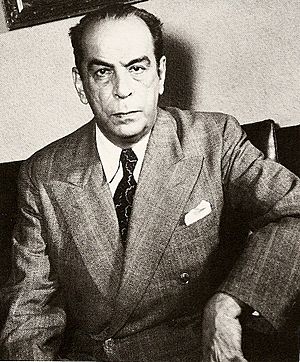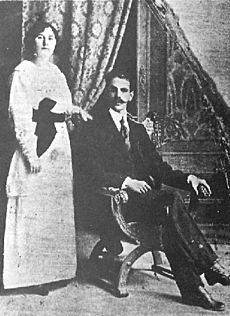Rómulo Gallegos facts for kids
Quick facts for kids
Rómulo Gallegos
|
|
|---|---|

Gallegos c. 1947-48
|
|
| President of Venezuela | |
| In office 17 February 1948 – 24 November 1948 |
|
| Preceded by | Rómulo Betancourt |
| Succeeded by | Carlos Delgado Chalbaud |
| Senator for life | |
| In office 23 January 1961 – 5 April 1969 |
|
| Personal details | |
| Born |
Rómulo Ángel del Monte Carmelo Gallegos Freire
2 August 1884 Caracas, Venezuela |
| Died | 5 April 1969 (aged 84) Caracas, Venezuela |
| Political party | Acción Democrática |
| Spouse | Teotiste Arocha Egui (1888–1950) |
| Signature | |
Rómulo Ángel del Monte Carmelo Gallegos Freire (born August 2, 1884 – died April 5, 1969) was a famous Venezuelan writer and politician. He is known as one of the most important Venezuelan novelists of the 20th century.
For about nine months in 1948, he was the first president of Venezuela chosen by a free election. However, military officers removed him from power later that year.
Contents
Early Life and His Books
Rómulo Gallegos was born in Caracas, Venezuela. His parents were Rómulo Gallegos Osío and Rita Freire Guruceaga. His family was not wealthy.
He started working as a schoolteacher, writer, and journalist in 1903. He also loved classical music.
His famous novel, Doña Bárbara, was published in 1929. This book criticized the government of the dictator Juan Vicente Gómez. Because of this, Gallegos had to leave Venezuela.
He went to live in Spain, where he kept writing. During this time, he wrote other well-known novels like Cantaclaro (1934) and Canaima (1935). He returned to Venezuela in 1936 and became the Minister of Public Education.
His Political Journey
In 1937, Rómulo Gallegos was elected to the Congress. From 1940 to 1941, he served as the Mayor of Caracas.
In 1945, he was part of a movement that brought Rómulo Betancourt to power. This period was known as "El Trienio Adeco."
In the 1947 election, Gallegos ran for president. He was the candidate for the Acción Democrática party. He won the election, which many believe was the country's first truly fair election. He received more than 74 percent of the votes, a record for a free election in Venezuela.
He became president on February 15, 1948. As president, he increased the government's share of oil profits from 43% to 50%. This tax plan was called "fifty / fifty." Other oil-producing countries, like Saudi Arabia, later used a similar system.
President Gallegos also started an "open-door" policy. This encouraged many people, especially from Italy, to move to Venezuela. Italians became the largest European group in the country.
However, in November 1948, army officers like Carlos Delgado Chalbaud and Marcos Pérez Jiménez removed him from power. This event is known as the 1948 Venezuelan coup.
After the coup, Gallegos sought safety in Cuba and then in Mexico. He returned to Venezuela in 1958 after the dictator Marcos Pérez Jiménez was overthrown. He was named a senator for life, but he no longer took an active role in politics.
Gallegos received the National Literature Prize in 1958 for his book La doncella. He was also chosen to be a member of the Venezuelan Academy of the Language.
From 1960 to 1963, he worked as a Commissioner for the Inter-American Commission on Human Rights. This group helps protect human rights in the Americas. He was also its first President in 1960.
Awards and Honors
In 1960, Rómulo Gallegos was nominated for the Nobel Prize in Literature. Many people in Latin America supported his nomination. He did not win the prize that year.
The Rómulo Gallegos International Novel Prize was created in his honor. It was started on August 6, 1964, by the Venezuelan president Raúl Leoni. The prize aims to remember Gallegos's work and encourage Spanish-language writers.
The Venezuelan government gives out this award. The first prize was given in 1967. It was awarded every five years until 1987, when it became a prize given every two years. The award includes a cash prize of €100,000, making it one of the richest literary prizes in the world.
Personal Life and Passing
Gallegos was married to Teotiste Arocha Egui. She was the First Lady of Venezuela in 1948. Rómulo Gallegos Freire passed away in Caracas on April 5, 1969.
In 2016, his grave was disturbed. His granddaughter shared her sadness, saying that even the remains of a former president were not safe.
His Published Books
- El último Solar (1920) (also known as Reinaldo Solar)
- La trepadora (1925)
- Doña Bárbara (1929)
- Cantaclaro (1934)
- Canaima (1935)
- Pobre negro (1937)
- El forastero (1942)
- Sobre la misma tierra (1943)
- La rebelión (1946)
- La brizna de paja en el viento (1952)
- Una posición en la vida (1954)
- El último patriota (1957)
- El piano viejo
See also
 In Spanish: Rómulo Gallegos para niños
In Spanish: Rómulo Gallegos para niños
- Presidents of Venezuela
- List of Venezuelans
 | Sharif Bey |
 | Hale Woodruff |
 | Richmond Barthé |
 | Purvis Young |


